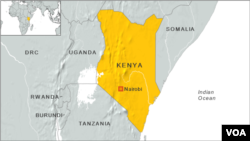Kenya’s Independent Electoral and Boundaries Commission (IEBC) has begun preparations for a general election March 4 of next year.
Ambassador Yusuf Nzibo, a commissioner at the IEBC, says the electoral body is implementing measures that will ensure a credible vote that will meet both local and international standards.
“There are a number of things which we have done and which we intend to do [and] one of them is to finish the demarcation of the new boundaries,” said Nzibo.
“What we will do this week is to go to the constituencies and have validations for the polling stations,” he said. “Because of the new number of constituencies, some of the polling stations will shift. So, we want to discuss with the communities where they think the best polling stations should be before we gazette.”
His comments came after some Kenyans expressed concern that the IEBC appears unprepared to organize a free, fair and credible election, devoid of violence. They said recent conflicts and the eruption of violence in parts of the country, said to be carried out by the Somali-based insurgent group al-Shabab, could undermine next year’s vote.
But Nzibo said in an interview with VOA that the IEBC is working with Kenya’s security agencies as well as the political parties to ensure a peaceful election.
He said the electoral body will soon begin training poll officials who will supervise and administer the vote.
“We’ve finished recruiting of the additional 18 new constituency election coordinators. As you know, currently we have 210 and we are going to have 290. So we expect them to be onboard by the first of October to be trained and to be brought to the level of the other constituency election coordinators,” Nzibo said.
Critics say the IEBC has been unable to educate enough Kenyans to ensure there is no repeat of the 2007-2008 post-election violence. But Nzibo insists his organization has implemented measures to prevent violence and dispute.
“What we’ve done basically is to begin voter education. We are preparing people first for them to understand what the constitution entails,” Nzibo said.
“For the first time [after the constitution was implemented] we will go to the ballot box. People will vote six times,” he said. “They will vote for the president, they will vote for the representatives of the house and also for the senate. There would be a government of the county, there would be a woman representative and there would be a country representative.”
Nzibo said that the IEBC is negotiating with the government to purchase biometric voter identification and registration kits, which he said, will enable the electoral body organize a credible list to be used for the election.
“They have already signed an agreement and we are hoping that the kits will be in time for us to begin voter registration by the end of October,” he said.
Ambassador Yusuf Nzibo, a commissioner at the IEBC, says the electoral body is implementing measures that will ensure a credible vote that will meet both local and international standards.
“There are a number of things which we have done and which we intend to do [and] one of them is to finish the demarcation of the new boundaries,” said Nzibo.
“What we will do this week is to go to the constituencies and have validations for the polling stations,” he said. “Because of the new number of constituencies, some of the polling stations will shift. So, we want to discuss with the communities where they think the best polling stations should be before we gazette.”
His comments came after some Kenyans expressed concern that the IEBC appears unprepared to organize a free, fair and credible election, devoid of violence. They said recent conflicts and the eruption of violence in parts of the country, said to be carried out by the Somali-based insurgent group al-Shabab, could undermine next year’s vote.
But Nzibo said in an interview with VOA that the IEBC is working with Kenya’s security agencies as well as the political parties to ensure a peaceful election.
He said the electoral body will soon begin training poll officials who will supervise and administer the vote.
“We’ve finished recruiting of the additional 18 new constituency election coordinators. As you know, currently we have 210 and we are going to have 290. So we expect them to be onboard by the first of October to be trained and to be brought to the level of the other constituency election coordinators,” Nzibo said.
Critics say the IEBC has been unable to educate enough Kenyans to ensure there is no repeat of the 2007-2008 post-election violence. But Nzibo insists his organization has implemented measures to prevent violence and dispute.
“What we’ve done basically is to begin voter education. We are preparing people first for them to understand what the constitution entails,” Nzibo said.
“For the first time [after the constitution was implemented] we will go to the ballot box. People will vote six times,” he said. “They will vote for the president, they will vote for the representatives of the house and also for the senate. There would be a government of the county, there would be a woman representative and there would be a country representative.”
Nzibo said that the IEBC is negotiating with the government to purchase biometric voter identification and registration kits, which he said, will enable the electoral body organize a credible list to be used for the election.
“They have already signed an agreement and we are hoping that the kits will be in time for us to begin voter registration by the end of October,” he said.





